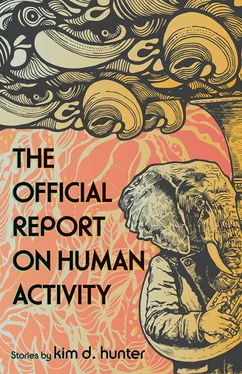The Scientist caught only bits of their back and forth and was prone to ponder them for much longer than he thought was productive. But it was a way of connecting, in a manner of speaking, to the rest of his family, reminding himself why he was completely alone.
What made the Scientist rise obscenely early in the morning was the desire to somehow craft a way to tell people what it was he did. It would have to be some combination of hologram, speaking, and writing, or maybe music. If he could find music that was slow and serious but could still lay in the background like a dark wall, music that drew just enough attention to itself, but not too much, that was the goal. Or maybe just a simple hologram of him singing the explanation of what he did would work. Or maybe he could learn to work one of those dead, android-like things and pretend it was talking instead of him, and have them both in a hologram. He was scanning his implant, thinking he would pursue all of the above, when something snagged his attention. The singing he was listening to lagged over from an almost skipped image. It captivated him so. He put it into the room there with him. He knew the sound was opera, that it was another language, Italian. But what he knew for sure, though the language was beyond him, was that the singer was pleading.
Vissi d’arte, vissi d’amore,
non feci mai male ad anima viva!
He was soon inconsolable over words he could not translate.
Nell’ora del dolor
perchè, perchè, Signor,
ah, perchè me ne rimuneri così?
In the spotlight of what seemed like a small room was the singer with a veil, dressed in white, with red gloves and red cloth shoes and a red waistcloth. Standing on her lap was a dead android figure with leaves over its breasts and vagina. It was supposed to be singing. The real singer’s face barely moved. Occasionally, she would look to the edges of the light where other people’s clothing and silhouettes were just visible.
* * *
The Scientist was almost afraid to find the translation of the song, lest it prove to be not as moving as the sound or, though it seemed impossible, more moving than the raw sound of the music. But he did learn that the figure whose lips moved as the singer sang was called a “dummy.” Even after learning that, he couldn’t help but think of the word “surrogate,” though he knew it was dead, virtually hollow, as he determined that the singer had her arm inside the figure.
She would have a hard time recalling where she had last heard the song. Then, later, on the way to prison to visit her father, it would come back to her, in waves.
* * *
Initially, the Scientist thought the dummy would be a good filter through which he could finally speak without inducing sleep, though he was also concerned. All of the surrogates seemed so strange and comical. How or where in the world could he possibly find a figure that would not make people laugh?
No one laughed when he spoke, and thus, the perfect dummy would be one that looked quite like him. He could print one from a combination of his photo for the face and, for the body, images of other surrogates.
As was noted in the early twenty-first century, before advanced printing, there is a space in human mimicry that leaves humans unsettled. The early devices produced mimics that were ghastly, not quite complete, not quite copies, not quite human. Children in particular felt a great discomfort seeing these creations that fell into the eerie zone between human and non-human faces. These days, it is difficult to reproduce those sorts of undead, nightmarish features because the printers reject them or jam up and have to be cleared.
But the Scientist, almost like an adolescent male prankster, overrode the printer because he was so desperate to get it right. Ironically, he got the same frightening results as the pranksters, dummies with freakishly disquieting facial oddities. In this case, the dummies had subtle but horrible creases around the eyes that made them seem less like facial features and more like creatures in their own right. Try as he might, he could not stop himself from stopping the machine before it had finished printing and so all the results were horrifying. His obsession with interrupting the printer’s cycle was powered by something at the bottom of his thinking, something kept just out of reach by frustration, something welded to the experience of fixing the interview machine that had malfunctioned during the Author’s interview, the great and fortuitous accident that had brought them together.
He succeeded with one goal, to be sure. He knew no one was going to laugh at the dummy that was supposed to speak in his stead. Even he, its creator, was barely able to focus on its face without turning away. Nonetheless, he was not ready to abandon the idea of speaking through the surrogate, teaching himself to speak without moving his lips.
He spent hours unearthing a serviceable singing voice. He taught himself the phonetics of the language sung by the Veiled Woman and her surrogate and fought the inclination to translate the song. This, he told himself, was in preparation for one last presentation to the CEO of his company to get his job back. In truth, he was in the thrall of the Veiled Woman, not so much in love with her as addicted to seeing and hearing her.
He woke up looking forward to sitting in front of the primitive external screen and listening to the voice that only it could emit. He wondered about the people who had been so insightful as to provide her a place, a platform to ply her extraordinary craft. He envied those in the audience. He pictured himself as one of them, people at the edge of her light.
* * *
One early morning, before the Bird arrived at her window, the Girl lay awake contemplating the logistical and economic challenges of running away to be with Nat and Tina. She heard the aria “Vissi d’Arte” drifting through the house. She knew the song from one of her opera freak friends whom the Bird also visited. Her friend had translated the aria, and the Girl, thinking of the translation, assumed it was her mother, the Author, playing the music.
Days and days later, one of the last things she would do for the Scientist before leaving the house would be to give him the translation. He read it and put his head in his hands. Water seeped between his fingers. She regretted what she had thought of him all these years and put her arms around him. She even suppressed the urge to draw back in horror when she glimpsed the small pile of figures that were not quite him laying crumpled in the corner of the room with their ghastly eyes.
* * *
A day or so later, the Scientist was riding along holding his surrogate in an opaque plastic bag on the seat next to him. He’d made a physical appointment to get in line for a lottery ticket that might allow him to speak with the CEO of his company. Part of the transport was in total darkness so as to obscure the route.
When he finally reached the ticket line, he found people in a joyous mood as if waiting for an amusement gram. It lifted his own spirits to the point where he felt like chatting with the others in line, many of whom wanted to know what was in the plastic bag.
Eventually, security beamed in to find out why so many people had laid down in line. By that time, the Scientist had moved many places ahead of what was becoming a pile of sleepers. He was less than ten places from a lottery ticket when security pounced. They grabbed him and those ahead of him in line who were still awake and began an interrogation.
The Scientist had never been more frightened. He spoke rapidly, and loudly, desperate to get back to the line. The others who had been in line with him were the first to fade, their knees buckling and heads nodding despite their wanting to remain upright and alert in the presence of such fearsome security units. But the security units themselves began to succumb, to feel woozy and heavy headed.
Читать дальше












